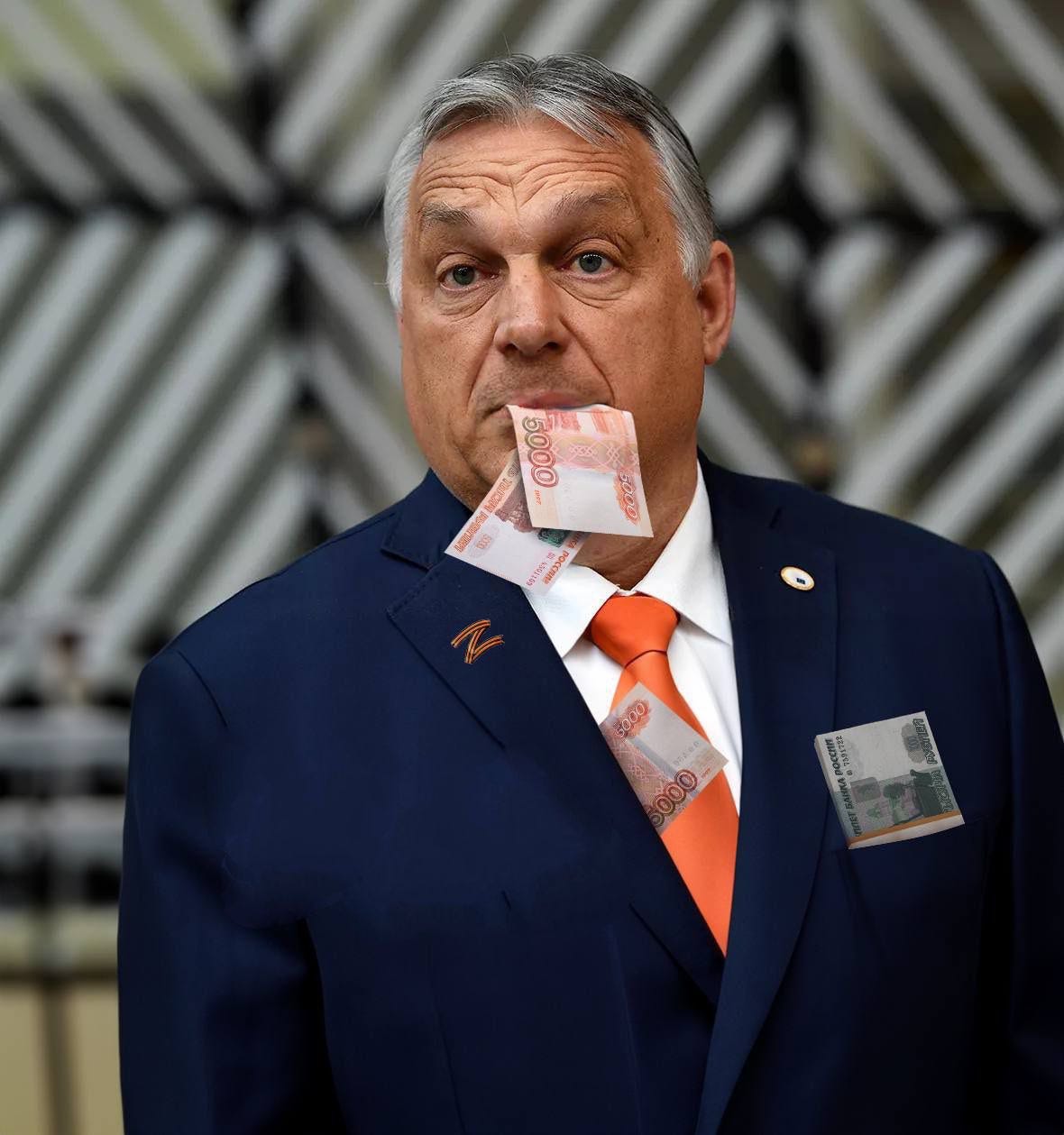The US Treasury recently sanctioned Gazprombank and its six foreign subsidiaries, among others.
To this, I say: FINALLY!
Gazprombank was the last remaining large Russian financial institution that was not sanctioned by the United States. The bank’s significant role in energy markets kept it off the OFAC blacklist…
…until November 21, 2024.
Russia’s European customers still purchased Russian energy using rubles. Russia after it began its full-scale invasion of Ukraine in 2022, required European countries that were purchasing its gas to pay by converting their currency into rubles. Buyers wound up having to open two accounts at Gazprombank: one in rubles and one in foreign currency in order to pay for Russia’s gas.
But Gazprombank wasn’t just any bank. It brought billions of dollars to the Kremlin, funding its war, paying savage Russian troops who tortured, raped, and murdered thousands of innocent Ukrainian civilians, and buying weapons that targeted Ukraine’s critical infrastructure.
Gazprombank is a conduit for Russia to purchase military materiel for its war effort against Ukraine. The Russian government also uses Gazprombank to pay its soldiers, including for combat bonuses, and to compensate the families of Russian soldiers killed fighting Putin’s brutal war against Ukraine. Australia, Canada, New Zealand, and the United Kingdom have previously sanctioned Gazprombank.
Poland and Bulgaria refused to open additional accounts at Gazprombank and were cut off from Russian gas supplies, while Hungary and Slovakia continued to purchase Russian gas and had long-term contracts with Gazprom. Now, they’ll have to find another way to pour blood money into the Kremlin’s pockets or face the risk of US sanctions.
Why?
Gazprombank is now sanctioned under executive order (EO) 14024. Treasury in June assessed that Russia had pivoted its entire economy toward its war in Ukraine. The transition meant that any entity designated under EO 14024 would carry with it a secondary sanctions risk—one that was authorized by EO 14114 in December 2023 against any foreign financial institution that transacted with Russia’s military sector.
That means that any foreign bank doing business with any of the several thousand individuals and entities designated pursuant to EO 14024 can now be cut off from the US and global financial systems thanks to the Dollar’s outsized role in international finance.
The Atlantic Council’s Kimberly Donovan confirms that this will be a challenge for those countries still buying Russian energy.
Today’s action will likely send shock waves across the financial sector as well as the oil and gas industry as financial institutions and oil importers and exporters review and consider the new sanctions landscape and how much risk they’re willing to take on to continue buying cheap oil from Russia.
The United States gave Gazprom’s remaining customers until late December to wind down their transactions. EU purchases of Russian energy will likely become impossible at the end of the year, subjecting those financial institutions still transacting with Gazprombank to the risk of secondary sanctions, meaning that they could be cut off from the US dollar, even if US persons or the US financial system are not involved in those transactions.
Hungary is crying loudly about these latest designations, calling them an attack on Hungarian sovereignty. The claim is ridiculous. The possible US secondary sanctions against foreign financial institutions transacting with Russia’s military aren’t telling these banks with whom they should conduct business. Hungary is free to continue transacting with Gazprombank, if it so chooses. The restriction is on US persons, not on Hungary. So Hungary has a choice: it can do business with Russia or the United States, but not both. It’s free to make that choice, knowing the consequences.
That’s very much respecting Hungary’s sovereignty. Budapest is free to make that choice.
There is still an exemption for Japan, related to the Sakhalin-2 oil and gas project, to the north of the country. The exemption is good through June 28, 2025, but Japan considers liquefied natural gas (LNG) from Sakhalin-2 important for its energy security, so who knows what will happen?
Why now?
The uncertainties associated with the incoming Trump administration have prompted Biden to finally sign off on this major tranche of sanctions. The United States didn’t just designate Gazprombank and its subsidiaries - Luxembourg-based bank GPB International SA, Hong Kong-based GPB Financial Services Hong Kong Limited, Cyprus-based GPB Financial Services Limited and GPB-DI Holdings Limited, Switzerland-based Gazprombank (Switzerland) Ltd, and South Africa-based GPB Africa and Middle East Pty Ltd.
Biden also finally issued limited authorization to Ukraine to strike Russia with longer-range, US-origin Army Tactical Missile System (ATACMS). Given the possible end to US support to Ukraine under the GOP majorities and Trump in the White House, the current administration is keen to do everything it can to put Ukraine in the best position for victory.
This tells me that the Biden administration was confident that Trump and the GOP were going to lose the 2024 election, slow-rolling aid to Ukraine for fear of escalation, and now they’re scrambling.
Not a good look.
What else?
OFAC also issued an alert highlighting the secondary sanctions risk associated with joining the Russian financial messaging system Sistema Peredachi Finansovykh Soobscheniy or “System for Transfer of Financial Messages” (SPFS)—Russia’s supposed alternative to the SWIFT messaging system from which major Russian banks were booted after the full-scale invasion of Ukraine began.
Sanctioned Iranian banks have joined SPFS, and Russia is encouraging others to join the system. Financial institutions have a choice: do business with the SPFS or have unfettered access to the world’s reserve currency - the US dollar - but not both. So when financial institutions perform due diligence on clients and business partners, membership in the SPFS is a secondary sanctions risk and a red flag.
As I’ve written previously, the mere threat of secondary sanctions is prompting financial institutions to back away from Russia. Media reports in January indicated that at least two state-owned banks in China began “reexamining” their relationships with Russian clients, and banks in Türkiye, which was working to be removed from the FATF grey list and finally accomplished this in June, also began to back away.
And while Iran bank cards can now be used in Russia (pariahs of a feather and all that), the Bank of China is reportedly blocking yuan-denominated transfers from countries believed to be exporting to Russia.
Russian companies are also facing a sharp increase in payment processing times in banks in Kazakhstan. Money transfers this month (November) took, on average, 24 percent longer than in July, and in some cases, the transfer of funds took two months.
As I said, secondary sanctions are an effective threat.
The EU has still not sanctioned Gazprombank, even as the United States finally did so, and the UK and other countries have had this financial institution under sanctions since at least 2022. It’s tougher for the EU, since consensus is a requirement, and Hungary, given its petulant whining, and Slovakia can both tank the effort to designate Gazprombank.
But this is a hard shot across the EU’s bow. Europe has already reduced its reliance on Russia, and European nations have bolstered supplies, including LNG from the United States. Although the United States is now Europe’s largest supplier of LNG, Russia is still in second place. Now, the countries that still rely on Russian energy need to step up efforts to wean themselves off the Russian gas teat.
Europe was already bracing for the potential end to flows of Russian gas through Ukraine when a transit deal expires at the end of the year. The sanctions will make it more difficult for President Vladimir Putin to profit from energy exports to Europe. European gas futures are at the highest for a year as the global supply outlook tightens.
Türkiye is also doing a panic dance. Ankara reportedly is in talks with the United States and Russia to get a sanctions waiver so it can continue paying Gazprombank for Russian LNG.
Turkish Energy Minister Alparslan Bayraktar referred to a previous waiver granted to Ankara when Washington earlier sanctioned Iran, saying Turkey needs something similar when it comes to Gazprombank in order for it to secure supply.
Without an exemption, Turkey won’t be able to pay Russia.
Yes, Türkiye has provided weapons to Ukraine to protect the country against Russian invaders, but Ankara has imposed no economic consequences on Russia, and frankly, while the military support is welcome, pouring money into Putin’s pockets while supplying weapons to Ukraine is a bit like speaking out of both sides of one’s mouth.
Make no mistake, the designation against Gazprombank and the bluntly put alert about Russia’s poor man’s version of SWIFT - the SPFS - should tell foreign financial institutions, and especially those European banks still doing business with the Russian financial system that their time to freely provide Putin with funds to murder innocent people is limited.







Well, when you consider that Gazprom 'owns' the bank, it's probably long overdue...
More sanctions are on the way… indeed, not a good look.